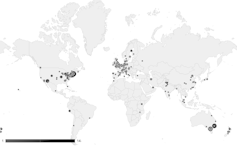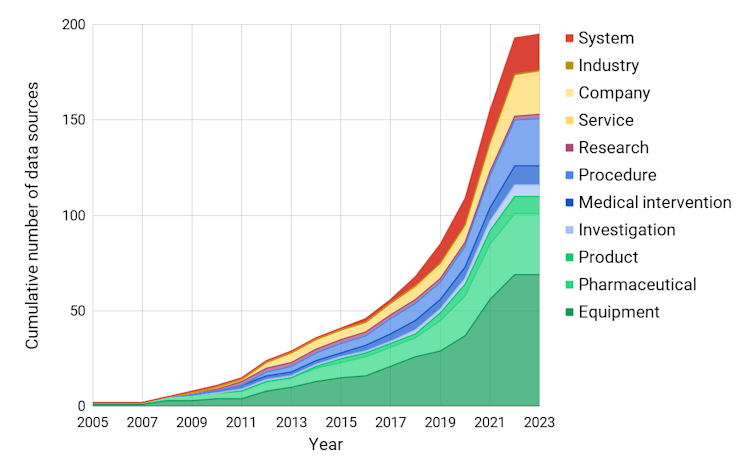
The health-care sector is threatened by the increasing impacts of global environmental change, but is also a significant contributor to the problem. Recent estimates suggest health care is responsible for between two and five per cent of global greenhouse gas, sulphur dioxide, nitrogen oxide and particulate matter emissions.
In 2020, England’s National Health Service became the first health system in the world to set a target of achieving net zero carbon dioxide emissions. Since then, a further 21 countries have committed to achieving net-zero health system emissions, and 58 nations have pledged to make their health systems sustainable and low-carbon.
Progress on this front will ultimately depend on two things:
- the rapid quantification of health care’s environmental impacts at all levels of service provision and across all geographic regions, and
- promptly providing this data to relevant stakeholders, including health care policymakers, managers, procurement teams, administrators, and health care workers themselves.
In an effort to aid this latter step, we recently launched HealthcareLCA: the first global living database of health care-related environmental impact assessments.
An innovative open-access platform
While researchers around the world are working hard to assess the environmental impacts of different aspects of health care, the HealthcareLCA database serves as an up-to-date repository for this work, bringing together new and existing assessments into one centralized location.

The database currently houses more than 4,500 environmental impact values (including, for example, contributions to global warming, ozone depletion, smog formation, and acidification) for nearly 1,500 health care products and activities. These include equipment, pharmaceuticals, investigations, procedures, treatments, services and entire health systems.
Importantly, HealthcareLCA is open-access and “living” in nature, meaning that our online database is freely accessible and continuously updated as new research becomes available.

When HealthcareLCA was launched in December 2022, in conjunction with a Personal View article in The Lancet Planetary Health, it included 152 studies published between 2000 and 2021. Since then, our research team has added a further 43 studies, indicating rapid growth within this important research field.
Interacting with the data
The HealthcareLCA platform is designed to be highly interactive, allowing users to sort, search and filter data according to their individual needs and interests.
Data can be readily organized by world region, country, institution, health care field, discipline, scale of analysis and environmental impact category assessed, among other parameters.
For instance, those interested in dentistry could quickly find studies relevant to their practice, including dental floss and toothbrushes, personal protective equipment, examination kits, materials used for fillings, and a range of procedures such as extractions, crowns and root canals.
More specifically, a surgical team in the United Kingdom that is interested in reducing the carbon footprint of its operating rooms could combine filter conditions to show only U.K.-based studies that have estimated the global warming potential of surgical equipment or procedures.
In this way, users can quickly appraise what has been studied within their field of interest, get a sense of the associated environmental impacts, and consider mitigation strategies they might wish to implement.
Our tutorial video provides an overview of how users can navigate and interact with the database, including several step-by-step examples of how to organize the data with different questions in mind.
A central access point to data
The HealthcareLCA database is designed to expedite knowledge translation in support of moving towards more sustainable health systems globally. We hope to provide relevant data to help inform and guide changes in health policy and practice, as well as to identify areas for future research. The database is intended to provide a central access point to that data for health care providers, policymakers and administrators.
For the first time, anyone with an interest in health care sustainability can easily find out what health care products and activities have been studied and begin learning about their associated environmental impacts.
We encourage readers to explore the online database, read about its role in supporting efforts to make health care more sustainable and engage in discussions about how we can work together to achieve sustainable health care provision globally.
HealthcareLCA is supported by CASCADES (Creating a Sustainable Canadian Health System in a Climate Crisis), which is a Canadian capacity-building initiative to address health care’s contribution to the climate crisis that is itself funded by Environment and Climate Change Canada’s Climate Action and Awareness Fund for Community-Based Climate Action Projects. HealthcareLCA is also supported by the Creating Sustainable Health Systems in a Climate Crisis flagship project at Dalhousie University’s Healthy Populations Institute and Brighton and Sussex Medical School (BSMS).
This article was originally published on The Conversation. Read the original article.







